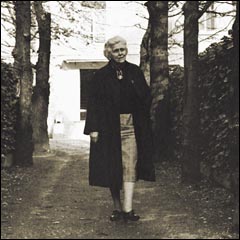This was a wonderful concert, and especially meaningful to me; because the last time I heard many of these songs, Joyce himself sang them to me.

Maria Jolas at Neuilly in 1964
Gisèle Freund and V.B. Carleton,
about the Jolases
If anyone could be called "godparents" to Finnegans Wake, it would be Maria and Eugene Jolas. During the difficult years when Joyce was composing his nocturnal epic (1922-1939), the Jolases showed Joyce nothing but kindness, generosity, sympathy, and understanding. Were it not for their support, there's a good chance the book might never have seen the light of day.
Maria McDonald Jolas, born in 1893 in Louisville, Kentucky, ran a school at Neuilly, l'Écôle Bilingue, and was famous for her work at the American Center on boulevard Raspail. Her husband Eugene was a writer, translator, and critic; it was he who in 1938 finally guessed the actual title of Finnegans Wake, which Joyce had kept a closely guarded secret up until that time while the book was being published in fragments.
The couple are best remembered for having founded the legendary literary magazine transition, "An International Quarterly for Creative Experiment," and in it they published serially various sections of Joyce's seemingly inscrutable novel under the title Work in Progress. Eugene was one of the key contributors to a series of essays, published in transition, which defended and attempted to explain the Wake; these were later collected and printed in a symposium entitled Our Exagmination Round His Factification for Incamination of Work in Progress.
Of the assistance that Maria gave Richard Ellmann in the composition of his life of Joyce, the famed biographer wrote in the Preface to the 1959 edition: "Mrs. Maria Jolas was one of the first to aid me, and without her help many of Joyce's later experiences would have eluded me. I am grateful to her also for reading the chapters on Joyce in Paris and suggesting improvements."
Eugene Jolas died in 1952. Maria continued with her own work as a translator for many years afterward. She died on March 4, 1987, at the age of 94.
Interestingly (insofar as this Web site deals with the topic of Joyce and music), the couple's eldest daughter, Betsy Jolas, has made a distinguished musical career for herself as a teacher and composer, both in the United States and in Europe. Her opera Schliemann, about the modern discovery of Troy by the German archaeologist, premiered in May 1995 at the Opéra de Lyon.
In 1926 Maria Jolas and her husband Eugene founded transition, a journal celebrated for its promotion of modern art and literature. transition was considered “by far the most provocative international magazine to be published during the era. A publication in transition was a necessary debut in the life of any literary aspirant.”1 Of begining the journal, Jolas wrote: “my husband and I discussed the founding of a magazine together, at our own expense. . . . transition was conceived, and the personal and financial sacrifice gladly accepted, in order to create a meeting place for all those artists on both sides of the Atlantic who were working towards a complete renovation, both spiritual and technical, of the various art forms.”2 In its more than ten years of publication, the journal printed work by Gertrude Stein, Kay Boyle, André Gide, and James Joyce, including the serial publication of his “Work in Progress,” which later became Finnegan’s Wake. Maria Jolas was very involved in supporting and promoting Joyce’s work; she was responsible for correcting the proofs of Finnegan’s Wake, in which some critics claim she is an identifiable character-presence. In addition to her work with transition, Jolas was an accomplished translator of work by André Breton, Leon-Paul Fargue, and especially experimental prose writer Nathalie Sarraute.
Comments (0)
You don't have permission to comment on this page.